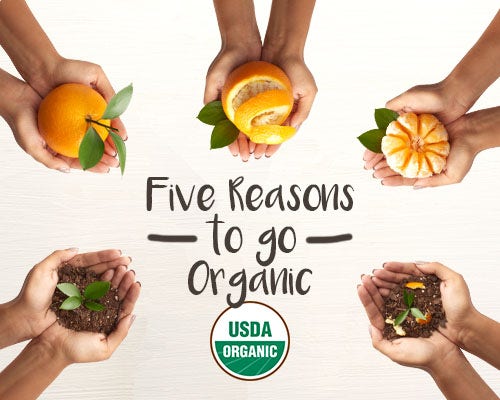Multiple Benefits of Choosing Organic
- 4/29/16

There are a lot of benefits to choosing organic. For starters, choosing Certified USDA Organic benefits us because organic foods typically have more vitamins, minerals, enzymes and micronutrients than conventionally grown foods. But that's not all. By choosing Certified USDA Organic, it means avoiding over one billion tons of certain pesticides used in conventional farming each year in the United States.
Conventional “chemical” farming has a limit on the maximum amount of each pesticide used, but there’s no limit to the number of different pesticides used, or the total amount of contamination that is allowed.
The truth is that over 3,000 high-risk toxins, including pesticides, are, by law, excluded from organic products, and organic farming has a residue-testing program verifying that prohibited pesticides aren’t applied. Organic also means no irradiation or sewage sludge; no synthetic fertilizers or prohibited pesticides—and no genetically modified organisms (GMOs). Organic food often tastes better, too.
Your family benefits from Certified USDA Organic as well. Conventional farming has exposed more than four generations of people to agricultural and industrial chemicals considered “safe levels” for adults, but not for children. Prior to birth, babies are exposed to hundreds of these harmful chemicals, and pound-per-pound, kids eat three-to-four times more food than adults do. That's a lot of potential chemical exposure if the food is not organically grown.
In fact, the Environmental Working Group (EWG) says that more than 250,000 American children ages one through five consume 20 different pesticides each day, while 20 million children ages five and under eat an average of eight pesticides every day, totaling 2,900 pesticide exposures per child, per year. However, studies show that pesticide levels become undetectable when children eat an organic diet, making organic a smart choice for you and your children.
But let’s not forget about how beneficial choosing Certified USDA Organic is when it comes to animals. Tens of millions of pounds of antibiotics are used in conventional animal feed each year, while conventionally raised livestock also receive sex hormones and growth hormones—which can’t be broken down by the livestock and are passed to whomever consumes them. With Certified USDA Organic, there are zero antibiotics or growth hormones; 100 percent organic feed, while giving animals access to the outdoors and upholding animal health and welfare standards.
It’s important to note that Certified USDA Organic is a healthy choice for our earth, too. Organic farming doesn’t allow use of toxic chemicals, but uses specific soil management with sustainable practices, water conservation methods and pollution reduction. Organic farming helps preserve ecosystems through crop rotation, soil preservation and biodiversity. By contrast, conventional farming includes chemicals, pesticides and fertilizers that contaminate our environment, including creating large dead zones in bodies of water. Only 0.1 percent of pesticides make it to their target, leaving 99.9 percent to adversely affect the environment.
Certified USDA Organic also positively affects the economy. For instance, becoming certified organic helps farmers receive premium prices for their products.
Conversely, conventional farming methods of mono-cropping and chemical fertilization result in topsoil loss totaling $40 billion per year in the U.S. Americans also pay billions of tax dollars each year for a farm bill that supports mostly conventional farming and agribusiness. Organic farming not only doesn't produce that kind of ecological and economic fallout, but it also shows great promise for creating jobs, for small business development and for boosting local and national economies. Organic farming is much more cost effective and works with nature, not against it.
You see? Those are just some of the benefits of choosing organic.
This information is intended for educational and informational purposes only. It should not be used in place of an individual consultation or examination or replace the advice of your health care professional and should not be relied upon to determine diagnosis or course of treatment.
Conventional “chemical” farming has a limit on the maximum amount of each pesticide used, but there’s no limit to the number of different pesticides used, or the total amount of contamination that is allowed.
The truth is that over 3,000 high-risk toxins, including pesticides, are, by law, excluded from organic products, and organic farming has a residue-testing program verifying that prohibited pesticides aren’t applied. Organic also means no irradiation or sewage sludge; no synthetic fertilizers or prohibited pesticides—and no genetically modified organisms (GMOs). Organic food often tastes better, too.
Your family benefits from Certified USDA Organic as well. Conventional farming has exposed more than four generations of people to agricultural and industrial chemicals considered “safe levels” for adults, but not for children. Prior to birth, babies are exposed to hundreds of these harmful chemicals, and pound-per-pound, kids eat three-to-four times more food than adults do. That's a lot of potential chemical exposure if the food is not organically grown.
In fact, the Environmental Working Group (EWG) says that more than 250,000 American children ages one through five consume 20 different pesticides each day, while 20 million children ages five and under eat an average of eight pesticides every day, totaling 2,900 pesticide exposures per child, per year. However, studies show that pesticide levels become undetectable when children eat an organic diet, making organic a smart choice for you and your children.
But let’s not forget about how beneficial choosing Certified USDA Organic is when it comes to animals. Tens of millions of pounds of antibiotics are used in conventional animal feed each year, while conventionally raised livestock also receive sex hormones and growth hormones—which can’t be broken down by the livestock and are passed to whomever consumes them. With Certified USDA Organic, there are zero antibiotics or growth hormones; 100 percent organic feed, while giving animals access to the outdoors and upholding animal health and welfare standards.
It’s important to note that Certified USDA Organic is a healthy choice for our earth, too. Organic farming doesn’t allow use of toxic chemicals, but uses specific soil management with sustainable practices, water conservation methods and pollution reduction. Organic farming helps preserve ecosystems through crop rotation, soil preservation and biodiversity. By contrast, conventional farming includes chemicals, pesticides and fertilizers that contaminate our environment, including creating large dead zones in bodies of water. Only 0.1 percent of pesticides make it to their target, leaving 99.9 percent to adversely affect the environment.
Certified USDA Organic also positively affects the economy. For instance, becoming certified organic helps farmers receive premium prices for their products.
Conversely, conventional farming methods of mono-cropping and chemical fertilization result in topsoil loss totaling $40 billion per year in the U.S. Americans also pay billions of tax dollars each year for a farm bill that supports mostly conventional farming and agribusiness. Organic farming not only doesn't produce that kind of ecological and economic fallout, but it also shows great promise for creating jobs, for small business development and for boosting local and national economies. Organic farming is much more cost effective and works with nature, not against it.
You see? Those are just some of the benefits of choosing organic.
This information is intended for educational and informational purposes only. It should not be used in place of an individual consultation or examination or replace the advice of your health care professional and should not be relied upon to determine diagnosis or course of treatment.





